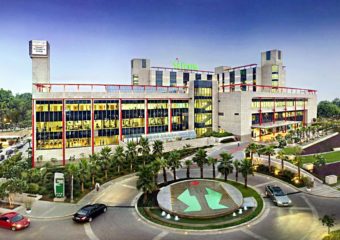Radiofrequency (Cardiac) Ablation Cost in India
Radiofrequency (cardiac) Ablation Cost in India ranges between USD 2500-5000 USD depending upon the type of ablation to be done whether 2D or 3D.
This procedure is not appropriate for patients with active infections, clotting issues, pregnancy and morbidly obese patients.
The entire procedure takes up to 30 minutes, and patient can return home the same day.
Radiofrequency Ablation Therapy is used to treat a wide variety of conditions including Pain management, Tumors, Cardiac Arrhythmia, Varicose Veins and Aesthetics dermatology.

Overview
Cardiac ablation uses heat or cold energy to create tiny scars in your heart to block abnormal electrical signals and restore a normal heartbeat. The procedure is used to correct heart rhythm problems (arrhythmias).
Cardiac ablation is most often done using thin, flexible tubes called catheters inserted through the veins or arteries. Less commonly, ablation is performed during cardiac surgery.
Why it's done
Cardiac ablation is a procedure that’s used to correct heart rhythm problems.
When your heart beats, the electrical signals that cause your heart to squeeze (contract) must follow a specific pathway through your heart. Any disruption in the signaling pathway can trigger an abnormal heartbeat (arrhythmia).
Depending on your type of heart rhythm problem, cardiac ablation may be one of your first treatments. Other times, it’s done when other medicines or treatments don’t work.
Your doctor may recommend cardiac ablation if you:
- Have tried medications to treat an arrhythmia without success
- Have had serious side effects from medications to treat arrhythmias
- Have certain types of arrhythmias that respond well to ablation, such as Wolff-Parkinson-White syndrome and supraventricular tachycardia
- Have a high risk of complications from arrhythmias, such as sudden cardiac arrest
Risks of cardiac ablation
Possible cardiac ablation risks include:
- Bleeding or infection at the site where the catheter was inserted
- Blood vessel damage
- Heart valve damage
- New or worsening arrhythmia
- Slow heart rate that could require a pacemaker to correct
- Blood clots in your legs or lungs (venous thromboembolism)
- Stroke or heart attack
- Narrowing of the veins that carry blood between your lungs and heart (pulmonary vein stenosis)
- Damage to your kidneys from dye used during the procedure
- Death in rare cases
Discuss the risks and benefits of cardiac ablation with your doctor to understand if this procedure is right for you.
What Are the Benefits of Ablation?
If you don’t treat AFib, your odds of blood clots, heart failure, or a stroke go up. These could be life-threatening.
The doctor will take your risk factors into account before they suggest a treatment. If you have no symptoms or if they’re mild, the doctor may watch and wait. But they might prescribe warfarin or another blood thinner to protect you from strokes.
Cardiac ablation may be right for you if AFib symptoms are more severe and make it hard to do daily tasks.
How you prepare
Your doctor may order several tests to get more information about your heart condition before your cardiac ablation.
You’ll need to stop eating and drinking the night before your procedure. Your doctor or nurse will tell you how or if you should continue any medications before a cardiac ablation.
Before cardiac ablation
Cardiac ablation is done in the hospital. A specialist will insert an IV into your forearm or hand and give you a medication called a sedative to help you relax.
The amount of sedation needed for the procedure depends on your specific arrhythmia and other health conditions. You may be being fully awake or lightly sedated, or you may be given general anesthesia (fully asleep).
During Cardiac Ablation
The doctor inserts the catheter through a blood vessel into your heart. More than one catheter is often used. The catheters may be inserted through a blood vessel in your groin (most common), shoulder or neck (less common).
Your doctor may inject dye through the catheter, which helps your blood vessels show up more clearly on X-ray images.
Sensors on the tip of the catheter send electrical impulses and record your heart’s electricity. Your doctor uses this information to identify the area that is causing your arrhythmia and to decide where to apply the ablation. This part of the procedure is called an electrophysiology (EP) study.
One of the following ablation techniques is used to create small scars in your heart and block the abnormal heart rhythms:
- Heat (radiofrequency energy)
- Extreme cold (cryoablation)
You may feel some minor discomfort when the catheter is moved into your heart and when energy is being delivered. If you have severe pain or shortness of breath, let your doctor know.
After Cardiac Ablation
Cardiac ablation usually takes three to six hours to complete (but it can vary a lot based on the type of arrhythmia you have).
Afterward, you’ll be taken to a recovery area for a few hours where doctors and nurses will closely monitor you. Depending on your condition, you may go home the same day or spend the night in the hospital. Plan to have someone else drive you home after your procedure.
Some people feel a little sore after the procedure. The soreness shouldn’t last more than a week. Most people return to normal activities within a few days after having cardiac ablation, but you should avoid any heavy lifting for about a week.
Results
Most people see improvements in their quality of life after cardiac ablation. But there’s a chance that your abnormal heartbeat may return. If this happens, the procedure may be repeated or you and your doctor might consider other treatments. Depending on your type of arrhythmia, you may still need to take heart medication after a cardiac ablation.Frequently Asked Questions about Radiofrequency Ablation
Q. How serious is heart ablation surgery?
A. Any procedure has risks. Problems with cardiac ablation can include: Bleeding or infection where the catheter went in. Damaged blood vessels if the catheter scrapes them.
Q. What is the success rate of cardiac ablation?
A. The overall success rate for catheter ablation is about 75%. Sometimes, people undergo a second procedure if the first one doesn’t work, which boosts the success rate to nearly 90%. The risks range from bleeding at the catheter insertion site to serious but very rare complications, such as heart attack or stroke.
Q. How long is heart ablation recovery?
A. At first, you’ll feel very tired and have some chest pain. You can probably go back to work in about 3 months, but it may take 6 months to get back to normal
Q. Will I feel better after heart ablation?
A. “The most extreme discomfort following cardiac ablation is usually limited to the standard side effects of anesthesia,” says Arkles. “Most people feel tired for a few hours after the waking up, but start to feel better once they can get up and walk around, usually 3 to 4 hours later.
Q. Are you awake during a heart ablation?
A. During surgical ablation, you can expect the following: General anesthesia (the patient is asleep) or local anesthesia with sedation (the patient is awake but relaxed and pain-free) may be used, depending on the individual case.
Q. Is shortness of breath normal after cardiac ablation?
A. Sometimes, you may feel as if your abnormal heart rhythm is starting, but then the symptoms stop. You may also have mild shortness of breath or fatigue. These symptoms are all normal and should subside within 4 to 6 weeks after the procedure.
Q. What tests are done before cardiac ablation?
A. Evaluation and preparation for catheter ablation may include some of the following tests:
- Electrocardiogram (ECG)
- Holter monitor test.
- Echocardiogram.
- Transesophogeal echocardiogram (TEE)
- Computed tomography (CT)
- Magnetic resonance imaging (MRI)
- International Normalized Ratio (INR) (if on Coumadin or warfarin)
Q. How long are you in the hospital after cardiac ablation?
A. What Happens After Catheter Ablation? You may have to stay in the hospital overnight after your ablation so your doctor and nurses can keep an eye on you while you recover. You’ll probably rest in bed about 6 to 8 hours after the procedure. Some people leave the hospital the same day.
Q. Who is a good candidate for cardiac ablation?
A. An individual who has very bothersome symptoms, such as palpitations, lightheadedness, shortness of breath, and exertional fatigue that is not responsive to at least one concerted effort at antiarrhythmic drug therapy, is a candidate for catheter ablation.






